Share

Europod • News
Best Podcast of the Year : Disability in Times of War
Once the Russian invasion of Ukraine started, people with disabilities suffered tremendously. And amid the panic and chaos that followed the invasion, many were unable to evacuate from their homes. This left people trapped in the crossfire without access to bomb shelters. In the first episode of the second season of Europe Talks Back, host Juli Simond tells the story of Tetyana Herasymova, who is one of the approximately 2.7 million Ukrainians with disabilities. Tanya is one of those who managed to flee. Ever since, she’s been helping fellow Ukrainians with disabilities stuck near the frontlines of the war in Ukraine. As the director of the Ukrainian NGO, Fight for Right, Tanya is committed to championing the needs and rights of disabled individuals, particularly during times of conflict. Drawing from her own experiences as a person with a disability navigating the challenges of war, Tetyana's dedication to promoting inclusivity and equality is unwavering and deeply impactful.
00:00:01 - Evacuation,
00:04:21 - Disability during war,
00:09:20 - Advocacy and recovery,
00:14:25 - Inclusion in Ukrainian politics,
00:20:32 - Challenges faced by disabled Ukrainians,
00:21:06 - Conclusion.
- Donate to Fight for Right's GoFundMe campaign to support their work with disabled individuals in Ukraine.
The second season of Europe Talks Back is produced in partnership with Sphera Network, the first network of independent media in Europe to reinvent the media space and paint a new picture of the continent through impactful, unbiased, raw and authentic stories.
The producer of Europe Talks Back is Maria Dios.
The host and narrator of Europe Talks Back is Juli Simond.
Sound editing and mixing is by Jeremy Bocquet.
Reporting for this story by Anna Romandash.
The executive producer of Europe Talks Back is Alexander Damiano Ricci.
- https://www.linkedin.com/linkedin.com/company/bulle-media/
- https://www.twitter.com/twitter.com/europodpodcasts
- https://www.europod.eu/
More episodes
View all episodes
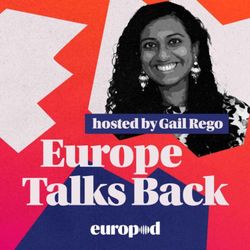
[REUPLOAD] Is gentrification a dirty word?
27:36|In this episode, we’re going to tackle the rapid spread of gentrification. Let’s deconstruct this term and look at the human impact of taking from communities to serve mostly financial interests.Join our host of Europe Talks Back season 3, Gail Rego as she has a conversation with our guest activists and scholars activists and scholars Jordi González Guzmán and Rita Silva.Tune into episode 6 now!Join us on our journey through the events that shape the European continent and the European Union.Production: EuropodFollow us on:LinkedInInstagram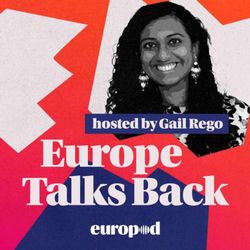
[REUPLOAD] The dark sides of the algorithm
26:32|Artificial Intelligence is all the rage and most of us use it every day knowingly whether it's to get music recommendations or unlock our phones. But how far has IA gotten? Do we know when AI is being used and by whom? And most importantly is AI neutral?Join us on our journey through the events that shape the European continent and the European Union.Production: EuropodFollow us on:LinkedInInstagram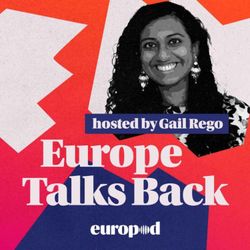
[REUPLOAD] Let's talk about digital gender based violence
25:51|According to the UN, 73% of women worldwide have experienced digital gender-based abuse: non-consensual intimate image-sharing, gender-based slurs or threats, online harassment, and unsolicited pornography. The consequences of this type of abuse go beyond the digital space, posing a threat to victim’s rights, health and safety both online and offline.Join our host of Europe Talks Back season 3, Gail Rego as she has a conversation with our guest activists and scholars Lilia Giugni and Silvia Semenzin.Tune into episode 4 now!Join us on our journey through the events that shape the European continent and the European Union.Production: EuropodFollow us on:LinkedInInstagram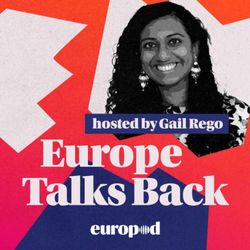
[REUPLOAD] Western feminism has a whiteness problem
25:44|White feminism is a self-proclaimed feminism shaped by the priorities of white, upper-middle-class, cisgender women. It assumes that all women experience misogyny in the same way - but it’s not.” What’s the point of breaking the glass ceiling if other women are left to pick up the pieces?Join our host of Europe Talks Back season 3, Gail Rego as she has a conversation with our guest French activist, feminist, journalist, filmmaker and writer Rokhaya Diallo. Tune into episode 3 nowThis series is produced in partnership with Sphera Network.Join us on our journey through the events that shape the European continent and the European Union.Production: Europod, with SpheraFollow us on:LinkedInInstagram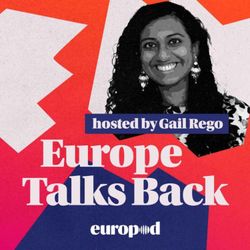
[REUPLOAD] What is Integration?
24:05|What is integration? What does it mean to you and the people who are expected to “integrate” into our societies?Having been born and raised as a migrant for her whole life, join our new host Gail Rego of Europe Talks Back as she unfolds the harmful and unreasonable expectations placed on people with a migration history and how this term is often used against people who migrate.Tune in and join our guests Razan Ismail and Hasnain Syed in this episode!Join us on our journey through the events that shape the European continent and the European Union.Production: Europod, with SpheraFollow us on:LinkedInInstagram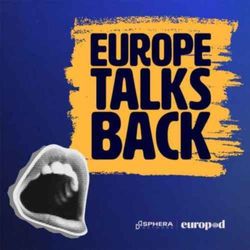
[REUPLOAD] Social media and mental health
26:03|In this episode of Europe Talks Back, Juli Simond tells the story of Pit-Roig Vinyals, a German language teacher based in Barcelona, Spain. Diagnosed with Borderline Personality Disorder (BPD) and Attention Deficit Hyperactivity Disorder (ADHD) at age 23, Pit-Roig turned her personal battles into a mission, emphasising on mental health stigma dismantlement and open conversations that were once considered taboo. With an experience of over eight years in managing her conditions, Pit-Roig provides valuable insight into how one's mental health can be critically affected by frequent social media usage. Reporting on the ground by Pablo Jiménez Arandia."We can channel our anger and anxiety towards positive change, but we must also be mindful of the content we consume online." - Pit-RoigAbout our reporter: Pablo Jiménez ArandiaKey moments00:00:04 - Introduction,00:02:59 - A Day in the Life,00:06:29 - The Impact of Social Media,00:09:10 - The Holocaust Remembrance Day,00:13:49 - The Paranoia and Escape,00:17:50 - The Concept of Doomscrolling,00:18:25 - Mental Health Impact of Constant Exposure to Negative News,00:19:18 - Pit-Roig Vinyals' Use of Twitter and Moral Obligation,00:21:14 - Ubertamen's Fight Against Mental Health Stigma,00:24:32 - Balancing Online News Consumption and Mental Well-being.Credits and staff The second season of Europe Talks Back is produced in partnership with Sphera Network, the first network of independent media in Europe to reinvent the media space and paint a new picture of the continent through impactful, unbiased, raw and authentic stories.The producer of this episode of Europe Talks Back is Maria Dios. The host and narrator of Europe Talks Back is Juli Simond. Sound editing and mixing is by Jeremy Bocquet. Reporting for this story by Pablo Jiménez Arandia.The executive producer of Europe Talks Back is Alexander Damiano Ricci.Social Mediahttps://www.linkedin.com/linkedin.com/company/bulle-media/https://www.twitter.com/twitter.com/europodpodcastshttps://www.europod.eu/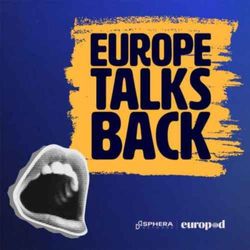
Reupload - [AWARD WINNING INVESTIGATION 2/2] Investigating Green Finance made in Europe
18:27|In the second episode of a special series of two, host Alexander Damiano Ricci talks to Stefano Valentino, an investigative freelance journalist who covered a case of greenwashing involving the French tire producer, Michelin, for the pan-European online media, Voxeurop.In particular, this podcast conversations uncovers the loopholes of green certification processes on financial markets.The original investigation was published in the form of a 4 article-long series under title "Investigating Green Finance made in Europe" and is co-authored by Emanuela Barbiroglio.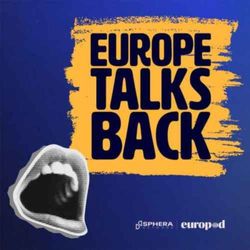
Reupload - [AWARD WINNING INVESTIGATION] Investigating Green Finance made in Europe
20:15|A huge congratulations to Stefano for this well-deserved recognition, and a big thank you to the team for helping bring this important investigation to our listeners!Stefano investigated a case of greenwashing involving the French tyre producer Michelin for the pan-European online media, Voxeurop.This episode explores Stefano’s groundbreaking work and emphasises the importance of tackling environmental challenges and the efforts being made to drive change. A huge congratulations to Stefano for this well-deserved recognition, and a big thank you to the team for helping bring this important investigation to our listeners!In collaboration with Sphera.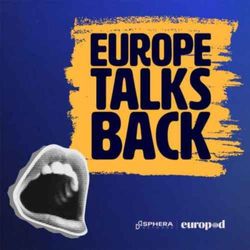
Reupload - Dieselgate Reloaded - Part 2
14:26|In this episode of Europe Talks Back, Gail Rego continues to dig into the investigation by Stefano Valentino published by the pan-European online media, Voxeurop, on how the European car industry has lobbied EU institutions to weaken Euro Seven, the next European Emission Standard. Over the years, the EU has adopted progressively more stringent regulations on car emissions, but establishing this new standard is proving to be more difficult than in the past.This story is part of an investigation conducted with Voxeurop and supported by the Journalismfund Europe, the European Excellence Exchange in Journalism (E³J) and Free Press Unlimited.“If there is no Euro Seven with stringent rules they will keep polluting the air that citizens breathe.” - Stefano Valentino About the author of the investigation: Stefano Valentino. Key moments00:00:00 - Intro00:01:00 - Thierry Breton00:05:15 - Decision 203500:08:43 - An unspoken deal00:10:35 - Another year00:13:05 - Outro